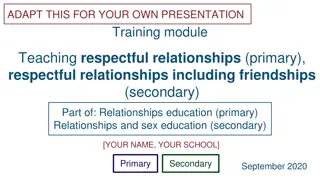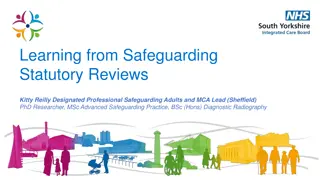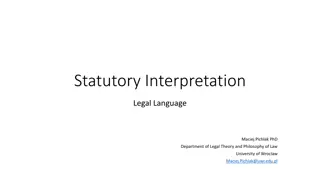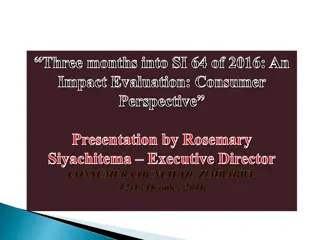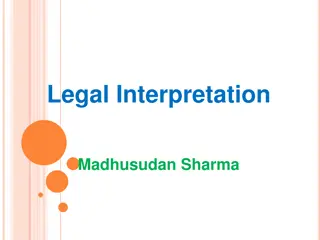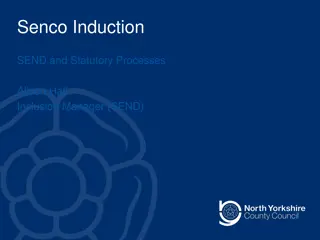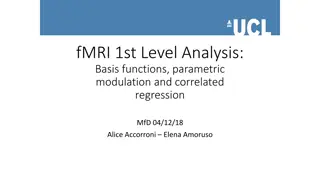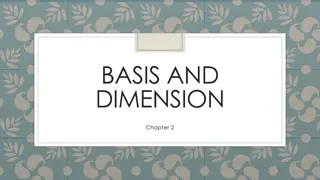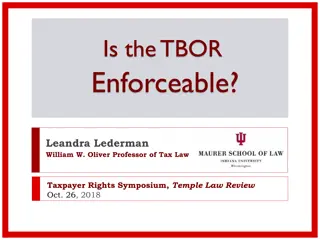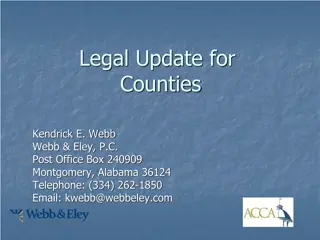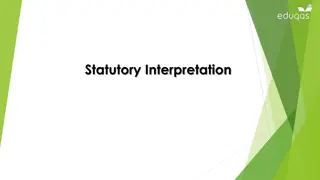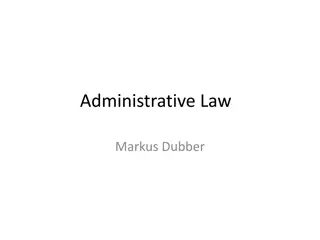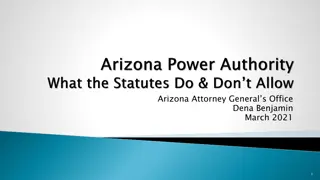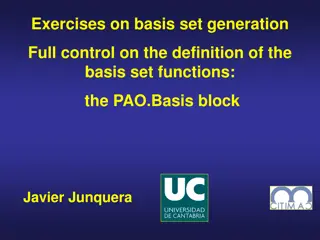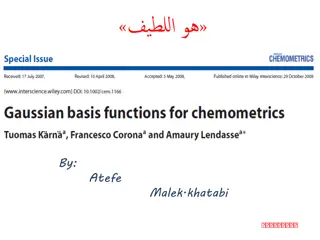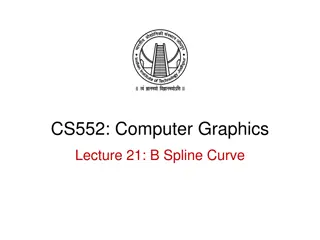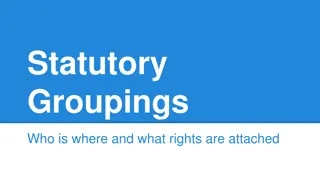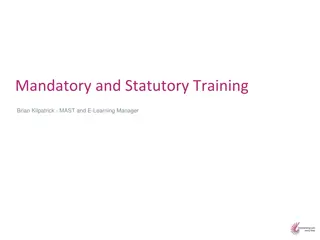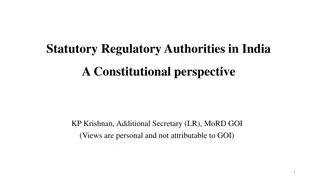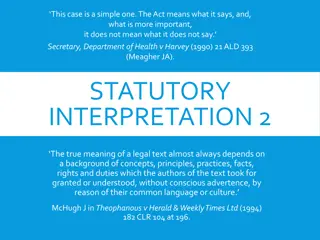Understanding the Duty to Report Child Abuse and Neglect
The duty to report concerns of child abuse, neglect, and harm is essential for practitioners and individuals coming into contact with children. This responsibility, whether statutory or non-statutory, requires prompt action to safeguard children at risk. Recognizing and acting on suspicions of abuse
0 views • 20 slides
Teaching Respectful Relationships: Primary and Secondary Curriculum Training Module
This training module focuses on teaching respectful relationships, including friendships, for primary and secondary school students. It covers key knowledge, strategies for handling class discussions, and ways to link topics across the curriculum. Schools can adapt this non-statutory guidance to com
2 views • 90 slides
Differences Between Statutory Crown Entity Boards and Commercial or NGO Boards
Statutory Crown entity boards differ from commercial or NGO boards in terms of ministerial influence, funding limitations, public scrutiny, and government standards. The responsible Minister has more interaction, and boards have limited discretion in funding and pricing adjustments. Crown entities f
1 views • 19 slides
Understanding Safeguarding Statutory Reviews and Best Practices
Exploring the importance of learning from safeguarding statutory reviews in various domains such as child practice, safeguarding adults, and domestic homicide reviews. The content discusses the statutory requirements for review processes and the responsibilities of relevant agencies in cases of abus
0 views • 7 slides
Core Area of Statutory Bank Branch Audit and Review of Advances by Hitesh Pomal
Explore the core areas of statutory bank branch audit, advances, NPAs, types of advances, review of advances, and considerations during the review. Learn about sanctioned terms, parameters, consortium advances, and frequent MOCs reported by auditors. Understand IRAC norms regarding income recognitio
0 views • 28 slides
Understanding the National Approach to Statutory Advocacy for Children and Young People
Exploring the significance of the National Approach to Statutory Advocacy for Children and Young People, this content delves into the role of advocates, the UN Convention on the Rights of the Child, and the fundamental principles guiding statutory advocacy. Learn about different types of advocacy, u
2 views • 44 slides
Understanding Different Types of Companies in Business
Explore the various kinds of companies in the business world, including statutory companies, registered companies, private companies, public companies, and more. Learn about the differences between private and public companies, statutory company examples like LIC and RBI, and the characteristics of
0 views • 25 slides
Understanding Statutory Interpretation in Legal Context
Explore the intricacies of statutory interpretation, linguistic and non-linguistic methods, and types of interpretation in legal contexts. Uncover the significance of legal reasoning, historical perspectives, and comparisons between Anglo-Saxon and Continental legal cultures. Delve into the complexi
1 views • 17 slides
Impact Evaluation of Statutory Instrument 64 of 2016 on Consumer Prices in Zimbabwe
Statutory Instrument 64 of 2016 in Zimbabwe regulates the importation of various products to promote local production. The legislation does not ban imports but requires licensing for bulk importers. The consumer prices of certain goods increased post-implementation, influenced by factors beyond SI 6
0 views • 14 slides
Legal Interpretation and Statutory Construction Guidelines
Legal interpretation and statutory construction present challenges when new laws are enacted. Courts must interpret statutes based on their popular sense, literal construction, and mischief rule to achieve the intended purpose. Sometimes, even clear language can pose difficulties in legal cases.
0 views • 9 slides
Statutory Assessment and Processes in Special Education
Understanding the statutory assessment process for children and young people with special educational needs and disabilities (SEND), including who can make requests, the steps involved, and the importance of EHCPs. Learn about the roles of casework managers and officers in assessing needs, providing
1 views • 15 slides
Accounting Basis Diagnostic Tool for NPOs and Funders
This diagnostic tool focuses on cash, modified cash, and accrual basis accounting for Non-Profit Organizations (NPOs) and funders. It explains the impact of accounting basis decisions and how to utilize the tool effectively. Designed for NPOs and funders, it helps in understanding, negotiating, and
0 views • 39 slides
Overview of EHCP Processes and Statutory Assessment Team
This content provides detailed information on EHCP processes, including the role of the Statutory Assessment Team, the number of EHCPs maintained over the years, and the responsibilities of Casework Officers in the assessment and review process. It covers the statutory assessment process, the involv
0 views • 42 slides
Mastering Academic and Research Report Writing
Academic and research report writing is a crucial skill for modern educators. This course covers principles, techniques, and tools for effective dissemination of findings. Learn about the meaning of reports, classification, steps for writing, layout, and mechanics of research reports. Understand the
0 views • 45 slides
Understanding fMRI 1st Level Analysis: Basis Functions and GLM Assumptions
Explore the exciting world of fMRI 1st level analysis focusing on basis functions, parametric modulation, correlated regression, GLM assumptions, group analysis, and more. Dive into brain region differences in BOLD signals with various stimuli and learn about temporal basis functions in neuroimaging
0 views • 42 slides
Understanding Basis and Dimension in Linear Algebra
Basis and dimension are fundamental concepts in linear algebra. A basis is a set of vectors in a vector space that allows us to represent any vector by multiplying and adding the basis vectors. The dimension of a vector space is the number of elements in its basis. Linear independence, spanning sets
0 views • 13 slides
Understanding Basis and Dimension in Linear Algebra
Basis and dimension are fundamental concepts in linear algebra. A basis is a set of vectors that can represent any vector in a given space through linear combinations. The dimension of a vector space is determined by the number of elements in its basis. Linear independence, spanning, finite-dimensio
5 views • 13 slides
Understanding the Enforceability of Taxpayer Bill of Rights (TBOR)
Explore the enforceability of the Taxpayer Bill of Rights (TBOR) as outlined in IRC 7803(a)(3), delving into its history, statutory interpretation, the question of remedy, and enforcement issues. Discover the evolution of TBOR, statutory text, and challenges surrounding its enforcement.
0 views • 21 slides
Understanding Basis Functions and Hemodynamic Response Functions in fMRI Analysis
This content discusses the use of basis functions, parametric modulation, and correlated regressors in the first-level analysis of fMRI data processing. It delves into the concept of temporal basis functions for modeling complex functions of interest, such as the canonical hemodynamic response funct
1 views • 26 slides
Understanding Intergovernmental Relations in Kenya
Intergovernmental Relations (IGR) in Kenya involve interactions between government entities within a decentralized system. This presentation outlines the institutional framework, disputes, progress of audits, and assets/liabilities in IGR. It emphasizes the importance of statutory and non-statutory
2 views • 44 slides
Legal Update on Statutory Cap for Cities and Counties in Alabama
Alabama's statutory cap on damages against cities and counties has been a topic of contention since its enactment in 1977. Attempts to circumvent this cap by suing city or county employees individually have led to legal debates and court decisions, such as the cases of Morrow v. Caldwell and Alabama
1 views • 36 slides
Understanding Statutory Interpretation: Rules, Approaches, and Challenges
Explore the concept of statutory interpretation, including the intention of Parliament, problems that can arise, various rules and approaches used in interpretation, aids and presumptions, criticisms, and the relationship between statutory interpretation, EU law, and precedent. The Literal Rule, a c
2 views • 26 slides
Trust Modifications: Best Practices and Pitfalls
Common law allows for modification of irrevocable trusts with consent from settlor and beneficiaries, but changes must align with trust purpose. Recent trends show more flexibility in trust modifications, with new statutory remedies and tools like decanting and nonjudicial settlement agreements. How
0 views • 19 slides
Understanding Three Approaches to Statutory Interpretation in Administrative Law
Explore the concepts of Ordinary Meaning, Context, and Three Approaches to Statutory Interpretation in Administrative Law through insightful discussions and relevant examples. Gain a deeper understanding of legal interpretation principles and their application in legal frameworks.
1 views • 14 slides
Understanding Electron Correlation and Basis Sets in Molecular Calculations
Polarized basis sets describe the electron density polarization in atoms and molecules to improve accuracy in computed geometries and frequencies. Diffuse basis sets are recommended for calculating electron and proton affinities. Electron correlations account for electron interactions in molecular c
0 views • 8 slides
Overview of Arizona Attorney General's Office Statutory Authority
The Arizona Attorney General's Office, represented by Dena Benjamin in March 2021, holds broad statutory authority subject to specific regulations and oversight. The office must adhere to various laws and regulations, file annual budgets, conduct audits, and comply with legal requirements in its ope
0 views • 26 slides
Understanding Basis Set Generation in Computational Chemistry
Detailed explanation and control over defining basis set functions, species labels, number of shells, basis set generation procedures, and solving the Schrödinger equation for ion generation. Explore schemes for generating multiple basis sets and the impact of extra charge on orbital localization i
0 views • 17 slides
Descriptive Analysis of Statutory Notifications from Residential Care Facilities in Ireland
This study conducted by Stephanie O'Regan, a Research Assistant at HIQA, presents a descriptive analysis of statutory notifications from residential care facilities for older persons and people with disabilities in Ireland. The research explores the types of adverse events reported, trends in notifi
0 views • 30 slides
Basis Production Procedure for AGATA through GRETINA Signal Decomposition
This presentation outlines the detailed procedure for generating basis signals in the context of AGATA data processed through GRETINA signal decomposition. It covers the generation of pristine basis signals, superpulse analysis, and the creation of cross-talk corrected basis files. The process invol
0 views • 19 slides
Functional Approximation Using Gaussian Basis Functions for Dimensionality Reduction
This paper proposes a method for dimensionality reduction based on functional approximation using Gaussian basis functions. Nonlinear Gauss weights are utilized to train a least squares support vector machine (LS-SVM) model, with further variable selection using forward-backward methodology. The met
0 views • 23 slides
Understanding B-Spline Curves in Computer Graphics
Exploring the advantages of B-spline curves over Bezier curves, this content delves into the representation, calculation of basis functions, and properties of B-spline curves. The discussion includes issues with Bezier curve representation, local control in B-spline curves, and the subdivision of th
0 views • 11 slides
Component Design Basis Inspection (CDBI) Program Overview
The Component Design Basis Inspection (CDBI) program ensures plant components are maintained within their design basis and monitors their capability to perform essential functions. Insights reveal the inspection frequency, estimated hours, fees, team composition, and inspection schedule. The baselin
0 views • 18 slides
Understanding Basis of a Set in Linear Algebra
A basis for a vector space V is an independent generating set. There are intuitive ways to confirm if a set is a basis, such as checking if it is independent and generates V. The dimension of V helps determine if a subset is a basis. Examples and methods like the extension theorem are explored to fi
0 views • 6 slides
Understanding Statutory Groupings in Teacher Evaluation Systems
Explore the statutory groupings in teacher evaluation systems, including the relationship between TAP and ISBE ratings, factors determining grouping in Group I to Group IV, and the specific rights attached to each group based on summative ratings. Learn who falls into Group 1 and Group 2 based on pe
0 views • 20 slides
Mandatory and Statutory Training Overview
Mandatory and Statutory Training (MAST) is essential for all staff to ensure compliance and competence in areas like Fire Safety, Health, Infection Prevention, and more. This training is guided by Brian Kilpatrick, the MAST and E-Learning Manager, and covers accessing the MAST system, checking compl
0 views • 10 slides
Understanding Statutory Regulatory Authorities in India: A Constitutional Perspective
This presentation explores the rationale, rise, and structure of Statutory Regulatory Authorities (SRAs) in India within a constitutional framework. It discusses the importance of specialization, independence from political pressures, and global developments in regulatory agencies. The content delve
0 views • 31 slides
Types of Companies in Corporate Administration
This article discusses the various kinds of companies in corporate administration, including incorporated, chartered, statutory, and registered companies. It covers the definition of a company, different types of legal entities, and examples of each type. The classification of companies based on inc
0 views • 17 slides
Principles of Statutory Interpretation in Legal Context
Understanding statutory interpretation involves analyzing legal texts in light of background concepts, principles, and legislative intent. This process requires considering various factors to determine the true meaning of a statute. Different cases and statutes are referenced to illustrate the compl
0 views • 15 slides
Pest Management Regulatory Approaches for Lakes Water Quality Workshop
Explore the regulatory framework for pest management in lakes, highlighting the role of councils, statutory and non-statutory plans, regional pest management strategies, and pest control programs. Discover key elements such as biosecurity objectives, statutory requirements, and the importance of col
0 views • 13 slides
Understanding Federal Sentencing Principles
Federal sentencing is determined by various factors including the applicable sentencing statute, statutory maximum and minimum terms of imprisonment, fines, supervised release terms, special assessments, the U.S. Sentencing Commission Guidelines Manual, judicial discretion, and factors outlined in 1
0 views • 26 slides

